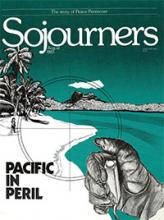A hush descends on the congregation and hovers for a moment in the expectant air of the cavernous cathedral. Then slowly, softly, a voice interrupts the quiet with a song:
The Spirit of the Lord is upon us,
because he has anointed us
to preach good news to the poor.
He has sent us to proclaim release to the
captives
and recovery of sight to the blind;
To set at liberty those who are oppressed,
to proclaim the acceptable year of the
Lord.
At the back of the church appears a dancer dressed in white. With a torch held high, she moves down the long middle aisle, while voices are added to the song. When she reaches the front, the Pentecost flame is lit from the torch, and more dancers spread out with bowls of water and leafy branches to anoint the congregation. As they dip the branches and scatter drops of water over the heads of the crowd, the song swells until it seems that the place might burst with the power of 3,000 voices united in a joyful tribute to the Spirit.
Before the last of several refrains is barely finished, the congregation begins singing, "We Shall Overcome." On the verse, "We are not afraid," we begin to sway, bound together in motion by raised handclasps and a plea for peace. We are overtaken by hope, some by tears, all by a spirit of jubilation such that applause thunders through the Washington Cathedral for several minutes at this closing of a service of prayer, song, and preaching that has lasted almost two hours.
This Sunday evening, May 22, of Peace Pentecost stirred awake images of the first Pentecost: a filled room, a rush of mighty wind, dancing flames, and then an explosion of utterances in many tongues. One might have described it as a delirious outburst of joyful chaos, a situation seemingly out of control to observers who had not caught the Spirit.
Read the Full Article

